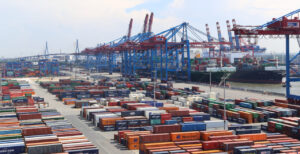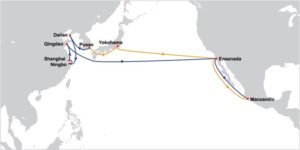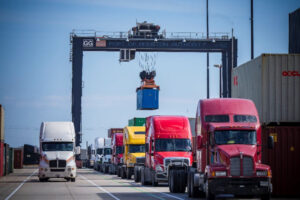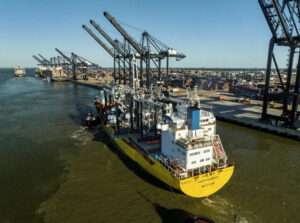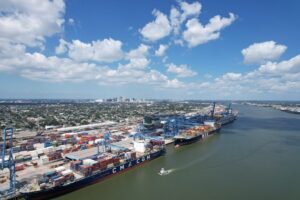Forth Ports, has announced its commitment and the actions it is taking to achieve a Net Zero carbon operation by 2042.
The company also outlined an interim target of achieving carbon neutral emissions (Scope 1 and 2) by 2032, while creating an infrastructure platform to help accelerate the UK’s path to a decarbonised economy.
To achieve this across the group’s eight ports, the team is overhauling and electrifying equipment and machinery, switching to low carbon fuels, increasing on-site renewable energy generation, and promoting low carbon delivery alternatives such as rail and barge.
This is complemented by significant investments in new port infrastructure to support the offshore wind revolution taking place in the North Sea.
All eight ports use environmentally sustainable sources of electricity, including on-site wind turbines at Tilbury, London’s major port.
All new warehouses will have solar roof panels installed as standard, such as the recently built 100,000 square foot facility at the Port of Grangemouth freight hub.
These projects are already satisfying a meaningful proportion of the ports’ power needs, according to the company.
Additionally, for mobile equipment and marine fleet, the strategy is to blend and use alternative fuels.
Initially, this involves the widespread use of sustainably sourced hydrogenated vegetable oil (HVO) and, as technology develops, other methods of low emission propulsion.
Forth Ports is working with its supply chain to drive down the group’s Scope 3 emissions.
These mainly stem from the use of steel and aggregate when constructing infrastructure or purchasing mobile port equipment and marine vessels.
The company is pro-actively engaging with suppliers to find fit-for-purpose, low carbon emission alternatives.
The ports group is additionally focused on delivering low-carbon logistics and large-scale port infrastructure to support green energy generation.
The group has overhauled its rail offering by investing heavily in four of its rail terminals, at Tilbury, Tilbury2, and Grangemouth, alongside progressing the reinstatement of a rail connection to Rosyth as part of the Forth Green Freeport initiative.
The group has recently installed shore-side power at Leith and its new development, Tilbury2, is shore-side power enabled to help drive down in-port emissions from visiting vessels.
READ: Kalmar adds to Forth Ports straddle carrier fleet
“Large-scale market-ready port infrastructure is essential for the deployment of offshore wind,” said Charles Hammond, Group Chief Executive of Forth Ports.
“We have made significant progress in supporting the offshore wind sector through our initial £150 million investment programme – a key plank to enable the transition to Net Zero – with plans to invest significantly more as this market develops, including the infrastructure required for floating offshore wind as installations go into ever deeper seas,” Hammond added.
In November 2022, Forth Ports container ports in Grangemouth and Tilbury welcomed new low emission Kalmar straddle carriers as part of a multimillion investment in handling equipment.


